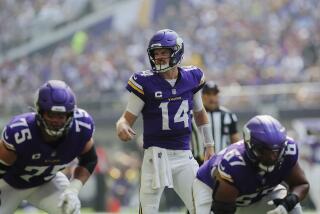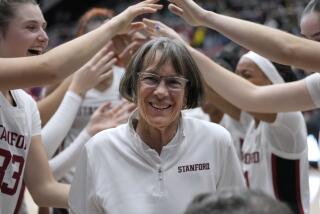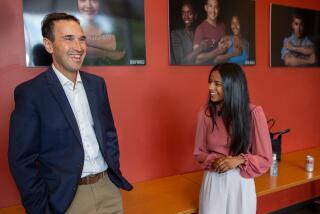COLLEGE FOOTBALL ’89 : COACHES, PLAYERS, TEAMS AND TRENDS TO WATCH : STANFORD’S DENNIS GREEN : First Black Football Coach in Pac-10 Is a Winner First
STANFORD — Bring up the subject of color, and Dennis Green might see red.
As the new football coach at Stanford University, Green, 40, is the first black in such a position in Pacific 10 Conference history. He is one of only four black football coaches at a major college.
Green was one of the final candidates for the Raider job when it was open 18 months ago. Had he been picked, he would have been the first black head coach in the National Football League.
But don’t try to classify Green as a pioneer. He sees himself as more like Eddie Robinson than Jackie Robinson. Green has become a head coach, he believes, because he spent 18 years earning it.
Green started in 1972 as a graduate assistant at the University of Iowa and has been working his way up ever since. He spent two tours of duty as an assistant at Stanford, was head coach at Northwestern for five years and has been a San Francisco 49er assistant the last three seasons under Bill Walsh.
“There shouldn’t be any significance placed on the fact that I’m black,” Green said. “I haven’t got any players simply because I was black. I haven’t lost any simply because I was black. I haven’t got any coaches that way, or got rid of any. There is nothing in this organization that has anything to do with my race, so we shouldn’t base it on that.
“I feel I’m prepared to come in here and do a good job, so I don’t really feel like there’s any additional pressure. I think obviously there are going to be certain people who are going to keenly watch, but you win because of your organization and your ability to get players and how you handle the game itself.”
Among those watching will be Rudy Washington, an assistant basketball coach at Iowa and executive director of the 2,000-member Black Coaches Assn.
“It’s well overdue,” Washington said of Green’s appointment. “He was for sure qualified. Stanford did the right thing.
“Our organization tries to help blacks get jobs like this that raise the consciousness and help the plight of black athletes and coaches. When this job came open, we told the school we felt Denny was well qualified. The rest was on him to get the job.”
But Washington is eager to make sure the pressure of an entire movement doesn’t come down squarely on Green’s shoulders.
“Denny is the head football coach who happens to be black,” Washington said. “I don’t think he should bear any more pressure than that. Everybody understands that if he doesn’t win, he’ll get fired like anybody else. This is a business. It’s OK to fail. All blacks are not successful, like all whites are not successful.”
Walsh called Green “the outstanding man in the country for the job.”
Doug Single, the man who hired Green at Northwestern, called it “ironic that a small, elite, white school is in the forefront of hiring black coaches.”
Stanford Athletic Director Andy Geiger, the man who hired Green, said it was an easy choice.
“It would be stupid to say I didn’t notice he was black,” Geiger said. “It’s a part of him, a wonderful part of him. But that’s not the reason to hire or not to hire. He won the job hands down on merit. He was the best we talked to.
“One hopes we can, in time, get to the point where it is not an issue through the civil rights effort in this country. We’re not there yet.”
But that time is drawing close, Green said.
“I hope we’ve gotten to the point where it doesn’t matter,” he said. “There aren’t many black coaches on the college level, and none on the pro level, but I think that’s going to change.”
Asked the difference between the college and pro games, Green smiled and replied, “I’m the head coach.
“What it comes down to (on the pro level) is you’ve got to have a guy who really wants to win, and has a clear-cut vision of what it’s going to take for his program to be successful.
“As a perfect example, let’s take the Philadelphia Eagles and (Coach) Buddy Ryan. How good would Philadelphia be had he not made a decision to go with (black quarterback) Randall Cunningham? Would they have made as much progress as quickly as they did?
“Probably not, because only Randall could do what they had to do to make such movement. To do that, Ryan had to sit down two veterans--(Ron) Jaworski and (Matt) Cavanaugh--to go with the player who was unproven.
“So what it takes is a guy who knows what he needs to win and then to get the best man, regardless of what religion he is, what color he is, how old he is, or what conference he’s in. Get the right man for the job regardless.”
There was a time when Dennis Green wasn’t sure he was the right man for any job in football.
A three-year starter as a tailback and flanker for Iowa, Green had a brief shot at pro ball in 1971 as a defensive back with the British Columbia Lions of the Canadian Football League.
Not seeing a bright future as a player and, by then, responsible for a wife and two children, he came back to Iowa and got jobs as volunteer coach and truck driver.
Green worked from 5 a.m. to noon every day, driving a truck and a tractor for a sheet metal company. Then he showered and spent the afternoon coaching football.
After four months, Green turned in his truck keys. Football would be his life, pay cut and all.
He became a full-time assistant coach at the University of Dayton in 1973. It was back to Iowa in ‘74, then on to Stanford in ’77 under Walsh. When Walsh went to the 49ers in ‘79, he took Green along. But Green returned to Stanford for the 1980 season to work for Paul Wiggin.
Then Green got his first shot as head coach, at Northwestern in 1981. For those unfamiliar with Big Ten football, Northwestern, in those days, could make the Clippers’ coaching job look like a plum. Win in the Big Ten? The question in those days was whether Northwestern, then 22 games into a 34-game losing streak, should even be in the Big Ten. Its record for its previous 63 games was 3-59-1.
That didn’t seem to be a great spot to earn a reputation. Did anybody advise Green not to take the job?
“Everybody!” he said. “Not one person thought that was a good idea.”
Except Single, now athletic director at SMU.
“Attendance was terrible,” Single said. “There was a hopeless feeling, and low self-esteem among our athletes. Dennis Green had the personality and style that could get translated into performance. He has a lot of energy, he’s intense about football, very demanding. But at the same time, he can be caring.”
Northwestern administrators found out how demanding right away. Before he took the job, Green laid out his own game plan for the school.
“Don’t fight me on this stuff,” he told school officials. “I’m here to find a solution to your problem. I think I have some of the answers. I did not have one ounce to do with how you destroyed this program. Not one ounce. I was on the West Coast winning football games, coaching pro football and being in bowl games, while you were becoming a blight on a conference that I played in and coached in and had a great deal of respect for.”
The Wildcats finished 0-11 Green’s first season. The next season, Northwestern beat Northern Illinois and conference foes Minnesota and Michigan State, and Green was voted Big Ten coach of the year.
After five years, Green had won 10 of 55 games. That would be a disaster at Michigan. It was a revival at Northwestern.
“He proved that they could at least be competitive,” Single said.
But after five years, that wasn’t enough.
“Our recruiting was affected by the university’s lack of commitment, particularly in the area of facilities,” Green said.
“The Big Ten is facility conscious. The West Coast is not. We couldn’t get a good financial commitment from the university, even though the capabilities were there. The alumni were willing to raise the money, but it was not a philosophical approach the university wanted to take. That’s where our differences were.
“The university did not want to make it seem like (football) has that much significance. They felt, if we build all these (facilities), then maybe people will start thinking that we’re really serious about football.
“We just couldn’t reach a common ground. I told them, ‘We don’t have to fight about it. If you don’t feel you can support the direction I want to take the program, we’ll just part.’ ”
So they did.
There were reports of some player dissatisfaction with Green when he left Northwestern. There was much of the same at Stanford with Green’s predecessor, Jack Elway.
It’s hardly Northwestern, but Stanford football, too, is languishing. The team of Pop Warner and Clark Shaughnessy and Walsh, of John Elway and Jim Plunkett and John Brodie was 3-6-2 last season. It has been three years since the Cardinal has had a winning season and been in a bowl game, 11 years since it has won a bowl game, 17 years since it has been in the Rose Bowl.
Stanford coaches must produce despite academic standards that are higher than for the rest of the Pac-10. The grade-point average comes out to 3.5 a player on the Cardinal football team, the average SAT score 1,043. Both figures are the best in the conference.
“Our coaches have a smaller pool from which to recruit,” Geiger said.
Green didn’t waste much time. He was hired away from the 49ers in January, while the club was preparing to play the Chicago Bears in the National Football Conference title game. Still ahead lay the Super Bowl. It would be a while before Green could concentrate on Stanford football.
All of a couple of hours.
The night he was hired, while still with the 49ers, Green was at Stanford helping to man a bank of phones hooked up to potential recruits, assuring them that he wanted them with the Cardinal.
There have been many changes since. The team that didn’t even have a play book now has one that rivals the 49ers’ in thickness. Preseason camp has been run with what some have described as military efficiency.
Players talk about a new feeling that somebody up there in the coaches’ office really cares. “He’s the kind of guy you can go in and talk to, and not necessarily about a personal problem,” said defensive lineman Lester Archambeau. “Just talk. He’s willing to respond.”
An old sign on Green’s desk reads, “Be reasonable. Do it my way.”
The players discovered what that meant one day in camp. Dissatisfied with the way practice was going, Green blew his whistle after about 10 minutes, called the players together, and told them to pretend that the previous few minutes had never happened. They were going to start practice all over and, this time, they would practice!
So much for anyone who thought Green might tip-toe into a job filled with high-profile pressure.
“I’d go back and drive a truck tomorrow if I had to make a decision between this job and what I thought was right,” he said.
More to Read
Go beyond the scoreboard
Get the latest on L.A.'s teams in the daily Sports Report newsletter.
You may occasionally receive promotional content from the Los Angeles Times.










